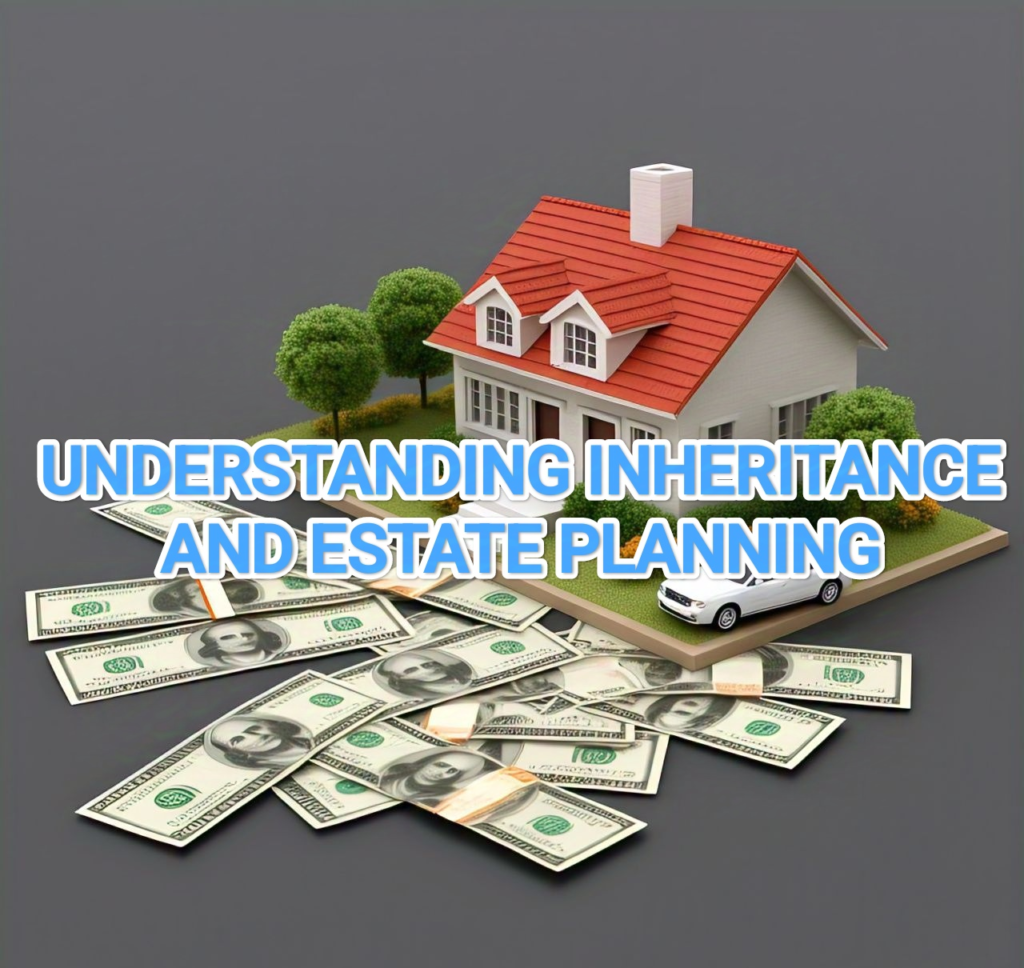NAVIGATING THE COMPLEXITIES OF INHERITANCE AND ESTATE PLANNING: MASTERING THE 7 TAX IMPLICATIONS FOR A SECURE FINANCIAL FUTURE
As a Canadian resident, understanding the intricacies of inheritance and estate planning is crucial for ensuring a secure financial future for you and your loved ones. The tax implications of inheritance and estate planning can be complex and overwhelming, making it essential to seek the guidance of a Canada tax expert or a financial advisor in Ontario.
In this comprehensive guide, we will delve into the world of inheritance and estate planning, exploring the tax implications and providing practical solutions to help you navigate these complexities.
UNDERSTANDING INHERITANCE AND ESTATE PLANNING

Inheritance refers to the assets, properties, and wealth that an individual receives from a deceased person. Estate planning, on the other hand, is the process of managing and distributing an individual’s assets during their lifetime and after their death.
Estate planning involves creating a will, establishing trusts, and designating beneficiaries for insurance policies and retirement accounts. It also involves understanding the tax implications of inheritance and estate planning, which can have a significant impact on the value of the estate.
IMPORTANCE OF ESTATE PLANNING IN CANADA

Estate planning is a crucial aspect of financial planning in Canada, ensuring that an individual’s assets are distributed according to their wishes after their death. A well-planned estate can provide peace of mind, minimize taxes, and ensure that loved ones are protected.
WHY ESTATE PLANNING IS ESSENTIAL IN CANADA
1. Avoids Family Conflict: A clear estate plan helps prevent family disputes and ensures that assets are distributed fairly.
2. Minimizes Taxes: A well-planned estate can reduce taxes, ensuring that more of your assets go to your loved ones.
3. Protects Beneficiaries: Estate planning ensures that beneficiaries, especially minors or those with disabilities, are protected and provided for.
4. Ensures Business Succession: For business owners, estate planning ensures a smooth transition of ownership and management.
5. Supports Charitable Giving: Estate planning allows individuals to make charitable donations, supporting their favourite causes.
6. Provides Peace of Mind: Knowing that your estate is planned and your wishes will be respected can provide immense peace of mind.
CONSEQUENCES OF NOT HAVING AN ESTATE PLAN IN CANADA
1. Intestacy: Without a will, the estate will be distributed according to provincial laws, which may not align with your wishes.
2. Increased Taxes: Without tax planning, the estate may be subject to unnecessary taxes, reducing the value of the estate.
3. Family Conflict: Without a clear estate plan, family members may dispute the distribution of assets, leading to conflict and potential litigation.
4. Delays and Costs: Without a well-planned estate, the administration of the estate may be delayed, resulting in increased costs and fees.
GETTING STARTED WITH ESTATE PLANNING IN CANADA
1. Consult a Professional: Seek the advice of a qualified estate planning professional, such as a lawyer or financial advisor.
2. Gather Information: Collect relevant documents, including assets, debts, and insurance policies.
3. Determine Goals: Identify your estate planning goals, including who will inherit your assets and how you want to distribute them.
4. Create a Plan: Develop a comprehensive estate plan, including a will, powers of attorney, and any necessary trusts.
By understanding the importance of estate planning in Canada and taking proactive steps to create a comprehensive plan, individuals can ensure that their wishes are respected, their loved ones are protected, and their legacy is preserved.
TAX IMPLICATIONS OF INHERITANCE AND ESTATE PLANNING

In Canada, the tax implications of inheritance and estate planning are governed by the Income Tax Act. The following are some key tax implications to consider:
1. Capital Gains Tax: When an individual inherits assets, such as real estate or investments, they may be subject to capital gains tax. This tax is calculated based on the difference between the fair market value of the asset at the time of inheritance and its original purchase price.
2. Probate Fees: Probate fees are charged by the province when an estate is probated. These fees can range from 0.5% to 1.5% of the estate’s value, depending on the province.
3. Estate Taxes: Estate taxes are not payable in Canada, but the estate may be required to pay taxes on any income earned during the year of death.
4. Inheritance Tax: Inheritance tax is not payable in Canada, but some provinces impose a tax on inheritances.
5. Income Tax: The estate may be required to pay income tax on any income earned during the year of death.
6. Taxation of Trusts: Trusts are taxed on their income, and the tax rates vary depending on the type of trust.
7. Charitable Donations: Charitable donations can provide tax benefits to the estate and the beneficiaries.
KEY TAX CONCEPTS IN INHERITANCE AND ESTATE PLANNING
1. Fair Market Value: The fair market value of an asset is its value at the time of inheritance or death.
2. Adjusted Cost Base: The adjusted cost base is the original purchase price of an asset, adjusted for any improvements or depreciation.
3. Capital Gains Exemption: The capital gains exemption allows individuals to exempt a portion of their capital gains from tax.
4. Terminal Return: The terminal return is the final tax return filed by the estate, reporting any income earned during the year of death.
STRATEGIES FOR MINIMIZING TAXES IN INHERITANCE AND ESTATE PLANNING

Minimizing taxes is a crucial aspect of inheritance and estate planning. Here are some strategies for minimizing taxes:
I. Income Tax Minimization Strategies
1. Income Splitting: Split income with family members to reduce taxes.
2. Tax Deferral: Defer taxes on investments, such as Registered Retirement Savings Plans (RRSPs).
3. Charitable Giving: Donate to charity to reduce taxes and support favourite causes.
4. Investment Tax Credits: Claim investment tax credits for investments in small businesses or research and development.
II. Capital Gains Tax Minimization Strategies
1. Capital Gains Exemption: Use the capital gains exemption to shelter gains on the sale of qualified small business corporation shares or qualified farm or fishing property.
2. Tax-Loss Harvesting: Offset capital gains with capital losses to minimize taxes.
3. Charitable Giving: Donate appreciated securities to charity to eliminate capital gains tax.
4. Holding Period: Hold assets for at least one year to qualify for long-term capital gains treatment.
III. Estate Tax Minimization Strategies
1. Gifting: Gift assets during lifetime to reduce the value of the estate.
2. Trusts: Establish trusts to minimize estate taxes and ensure asset protection.
3. Charitable Giving: Donate to charity to reduce estate taxes and support favourite causes.
4. Estate Freeze: Freeze the value of the estate by transferring assets to a trust or other beneficiaries.
IV. Probate Fee Minimization Strategies
1. Multiple Wills: Create multiple wills to minimize probate fees.
2. Trusts: Establish trusts to minimize probate fees and ensure asset protection.
3. Beneficiary Designations: Designate beneficiaries for insurance policies, retirement accounts, and other assets to avoid probate.
4. Joint Ownership: Hold assets jointly with others to avoid probate.
V. Tax-Efficient Investing Strategies
1. Tax-Efficient Investment Strategies: Invest in tax-efficient investments, such as index funds and dividend-paying stocks.
2. Registered Accounts: Utilize registered accounts, such as RRSPs and Tax-Free Savings Accounts (TFSAs).
3. Charitable Giving: Donate to charity to reduce taxes and support favourite causes.
4. Tax-Loss Harvesting: Offset capital gains with capital losses to minimize taxes.
By implementing these strategies, individuals can minimize taxes in inheritance and estate planning, ensuring that more of their assets go to their loved ones and favourite causes.
PRACTICAL SOLUTIONS FOR NAVIGATING THE TAX IMPLICATIONS OF INHERITANCE AND ESTATE PLANNING

Navigating the tax implications of inheritance and estate planning can be complex and overwhelming. However, with the right strategies and planning, individuals can minimize taxes, ensure asset protection, and provide for loved ones. Here are some practical solutions for navigating the tax implications of inheritance and estate planning:
I. Tax Planning Strategies
1. Income Splitting: Split income with family members to reduce taxes.
2. Tax Deferral: Defer taxes on investments, such as Registered Retirement Savings Plans (RRSPs).
3. Charitable Giving: Donate to charity to reduce taxes and support favourite causes.
4. Trusts: Establish trusts to minimize taxes and ensure asset protection.
II. Estate Planning Solutions
1. Wills: Create a will to outline how assets will be distributed after death.
2. Powers of Attorney: Establish powers of attorney to grant authority to act on behalf of the individual.
3. Trusts: Establish trusts to manage assets and minimize taxes.
4. Beneficiary Designations: Designate beneficiaries for insurance policies, retirement accounts, and other assets.
III. Asset Protection Strategies
1. Asset Segregation: Segregate assets to protect them from creditors and lawsuits.
2. Trusts: Establish trusts to protect assets and minimize taxes.
3. Insurance: Purchase insurance to protect assets and provide for loved ones.
4. Business Succession Planning: Establish a business succession plan to protect business assets.
IV. Tax-Efficient Investing
1. Tax-Loss Harvesting: Offset capital gains with capital losses to minimize taxes.
2. Tax-Efficient Investment Strategies: Invest in tax-efficient investments, such as index funds and dividend-paying stocks.
3. Registered Accounts: Utilize registered accounts, such as RRSPs and Tax-Free Savings Accounts (TFSAs).
4. Charitable Giving: Donate to charity to reduce taxes and support favourite causes.
V. Seeking Professional Advice
1. Consult a Tax Professional: Consult a tax professional to ensure tax compliance and minimize taxes.
2. Consult an Estate Planning Professional: Consult an estate planning professional to create a comprehensive estate plan.
3. Consult a Financial Advisor: Consult a financial advisor to create a comprehensive financial plan.
4. Consult a Lawyer: Consult a lawyer to create a comprehensive estate plan and ensure asset protection.
By implementing these practical solutions, individuals can navigate the tax implications of inheritance and estate planning, minimize taxes, ensure asset protection, and provide for loved ones.
ADVANCED ESTATE PLANNING STRATEGIES

Estate planning is a complex and dynamic field that requires ongoing updates and revisions to ensure that an individual’s wishes are respected and their assets are protected. Advanced estate planning strategies involve sophisticated techniques and tools that can help minimize taxes, ensure asset protection, and provide for loved ones.
1. Using Life Insurance in Estate Planning
Life insurance can play a crucial role in estate planning by providing liquidity to pay taxes, debts, and other expenses. It can also be used to create an estate or to fund a trust.
Types of Life Insurance Policies:
1. Term Life Insurance
2. Whole Life Insurance
3. Universal Life Insurance
4. Variable Life Insurance
2. Implementing a Multiple Will Strategy
A multiple will strategy involves creating two or more wills to manage different types of assets. This strategy can help minimize probate fees and taxes.
Types of Multiple Wills:
1. Primary Will
2. Secondary Will
3. Trust Will
3. Establishing an Alter Ego Trust or Joint Partner Trust
An alter ego trust or joint partner trust is a type of trust that allows individuals to transfer assets to a trust while still maintaining control and benefiting from the assets.
Benefits of Alter Ego Trusts and Joint Partner Trusts:
1. Tax Minimization
2. Asset Protection
3. Control and Flexibility
4. Probate Avoidance
4. Using Charitable Giving in Estate Planning
Charitable giving can play a significant role in estate planning by providing tax benefits and supporting favourite causes.
Types of Charitable Giving Strategies:
1. Donations of Cash or Securities
2. Donations of Real Estate or Other Assets
3. Charitable Remainder Trusts
4. Charitable Lead Trusts
5. Establishing a Family Trust
A family trust is a type of trust that allows individuals to transfer assets to a trust for the benefit of family members.
Benefits of Family Trusts:
1. Tax Minimization
2. Asset Protection
3. Control and Flexibility
4. Probate Avoidance
6. Implementing an Estate Freeze
An estate freeze is a strategy that involves freezing the value of an individual’s estate and transferring future growth to a trust or other beneficiaries.
Benefits of Estate Freezes:
1. Tax Minimization
2. Asset Protection
3. Control and Flexibility
4. Probate Avoidance
7. Using Insurance Trusts in Estate Planning
Insurance trusts are a type of trust that allows individuals to transfer life insurance policies to a trust, providing tax-free benefits to beneficiaries.
Benefits of Insurance Trusts:
1. Tax Minimization
2. Asset Protection
3. Control and Flexibility
4. Probate Avoidance
8. Establishing a Trust for Minor Children
A trust for minor children is a type of trust that allows individuals to transfer assets to a trust for the benefit of minor children.
Benefits of Trusts for Minor Children:
1. Tax Minimization
2. Asset Protection
3. Control and Flexibility
4. Probate Avoidance
By implementing these advanced estate planning strategies, individuals can ensure that their assets are protected, their taxes are minimized, and their loved ones are provided for. It is essential to consult with a qualified estate planning professional to determine the best strategies for your specific situation.
COMMON MISTAKES TO AVOID IN INHERITANCE AND ESTATE PLANNING

Inheritance and estate planning can be complex and nuanced, and even small mistakes can have significant consequences. Here are some common mistakes to avoid:
- Failing to Create a Will: Not having a will can lead to intestacy, where the estate is distributed according to provincial laws, rather than the deceased’s wishes.
- Not Updating the Will: Failing to update the will can result in outdated wishes being carried out, rather than current ones.
- Not Considering Tax Implications: Failing to consider tax implications can result in unnecessary taxes and reduced value of the estate.
- Not Establishing Trusts: Failing to establish trusts can result in assets being distributed according to provincial laws, rather than the deceased’s wishes.
- Not Designating Beneficiaries: Failing to designate beneficiaries can result in assets being distributed according to provincial laws, rather than the deceased’s wishes.
- Not Considering Business Succession: Failing to consider business succession can result in the business being sold or dissolved, rather than being passed on to the next generation.
- Not Considering Charitable Giving: Failing to consider charitable giving can result in missed opportunities for tax benefits and supporting favourite causes.
- Not Seeking Professional Advice: Failing to seek professional advice can result in costly mistakes and unnecessary taxes.
- Not Reviewing and Updating Powers of Attorney: Failing to review and update powers of attorney can result in outdated documents that no longer reflect the individual’s wishes.
- Not Considering Digital Assets: Failing to consider digital assets can result in online accounts and digital property being inaccessible or distributed incorrectly.
- Not Considering Funeral Arrangements: Failing to consider funeral arrangements can result in unnecessary stress and expense for loved ones.
- Not Considering Long-Term Care: Failing to consider long-term care can result in unexpected expenses and reduced quality of life.
- Not Considering Disability Planning: Failing to consider disability planning can result in reduced quality of life and unnecessary expenses.
- Not Considering Tax Implications of Inherited Assets: Failing to consider tax implications of inherited assets can result in unnecessary taxes and reduced value of the estate.
- Not Considering Impact of Remarriage on Estate Plan: Failing to consider impact of remarriage on estate plan can result in outdated documents and unintended consequences.
By avoiding these common mistakes, individuals can ensure that their estate plan is effective, efficient, and reflects their wishes. It is essential to consult with a qualified estate planning professional to ensure that the estate plan is tailored to the individual’s specific needs and circumstances.
FREQUENTLY ASKED QUESTIONS
Here are some frequently asked questions about navigating the complexities of inheritance and estate planning:
1. What is the difference between inheritance and estate planning?
Inheritance refers to the assets, properties, and wealth that an individual receives from a deceased person. Estate planning, on the other hand, is the process of managing and distributing an individual’s assets during their lifetime and after their death.
2. Why is estate planning important?
Estate planning is important because it ensures that an individual’s assets are distributed according to their wishes after their death. It also helps minimize taxes, ensures asset protection, and provides for loved ones.
3. What are the tax implications of inheritance?
The tax implications of inheritance depend on the type of asset inherited and the province of residence. In general, inherited assets are subject to capital gains tax, and the estate may be required to pay income tax on any income earned during the year of death.
4. What is the role of a will in estate planning?
A will is a legal document that outlines how an individual’s assets will be distributed after their death. It is a crucial component of estate planning, as it ensures that an individual’s wishes are respected and their assets are distributed according to their wishes.
5. What are trusts, and how are they used in estate planning?
Trusts are legal arrangements that allow individuals to transfer assets to a trust for the benefit of others. Trusts are commonly used in estate planning to minimize taxes, ensure asset protection, and provide for loved ones.
6. How can I minimize taxes in my estate plan?
There are several strategies that can be used to minimize taxes in an estate plan, including income splitting, tax deferral, and charitable giving. It is essential to consult with a qualified estate planning professional to determine the best tax-minimization strategies for your specific situation.
7. What is the difference between a power of attorney and a will?
A power of attorney is a legal document that grants someone the authority to act on your behalf during your lifetime. A will, on the other hand, is a legal document that outlines how your assets will be distributed after your death.
8. Can I update my estate plan after it’s been created?
Yes, you can update your estate plan after it’s been created. In fact, it’s essential to review and update your estate plan regularly to ensure that it continues to reflect your wishes and circumstances.
9. How often should I review my estate plan?
It’s recommended that you review your estate plan every 3-5 years or whenever there are significant changes in your life, such as a marriage, divorce, or birth of a child.
10. What are the consequences of not having an estate plan?
The consequences of not having an estate plan can be severe, including unnecessary taxes, family conflicts, and assets being distributed according to provincial laws rather than your wishes.
By understanding the answers to these frequently asked questions, you can better navigate the complexities of inheritance and estate planning and create a secure financial future for yourself and your loved ones.
CONCLUSION
Navigating the complexities of inheritance and estate planning requires a thorough understanding of the tax implications and a well-planned strategy. By mastering the tax implications of inheritance and estate planning, individuals can ensure a secure financial future for themselves and their loved ones.
KEY TAKEAWAYS
1. Inheritance and estate planning involve complex tax implications that require careful planning.
2. Understanding the tax implications of inheritance and estate planning is crucial for minimizing taxes and ensuring a secure financial future.
3. A well-planned estate plan should include a will, powers of attorney, and trusts.
4. Tax planning strategies, such as income splitting and tax deferral, can help minimize taxes.
5. Seeking professional advice from a qualified estate planning professional is essential for ensuring a well-planned estate.
NEXT STEPS
1. Review and Update Your Estate Plan: Review your estate plan to ensure it is up-to-date and reflects your current wishes.
2. Seek Professional Advice: Consult with a qualified estate planning professional to ensure your estate plan is well-planned and tax-efficient.
3. Consider Tax Planning Strategies: Consider tax planning strategies, such as income splitting and tax deferral, to minimize taxes.
4. Stay Informed: Stay informed about changes to tax laws and regulations that may impact your estate plan.
5. Communicate with Your Loved Ones: Communicate your estate plan with your loved ones to ensure they understand your wishes.
FINAL THOUGHTS
Inheritance and estate planning are complex and nuanced topics that require careful planning and consideration. By mastering the tax implications of inheritance and estate planning, individuals can ensure a secure financial future for themselves and their loved ones. Remember to stay informed, seek professional advice, and communicate with your loved ones to ensure your estate plan is effective and efficient.
CALL TO ACTION
Book a consultation with a Canada tax expert or a financial advisor in Ontario today to ensure you are prepared for the tax implications of inheritance and estate planning.
ABOUT AUTHOR
Shanel John is a dedicated Certified Public Accountant (CPA) at G.L.H. Accounting, specializing in Income Tax with 10 years of experience. Based in Brampton, Ontario, Canada, Shanel offers expertise in tax preparation, financial accounting, and advisory services. A certified QBO Pro Advisor, Shanel’s decade-long experience and knowledge make her a trusted figure in the accounting field.
ADDITIONAL RESOURCES
For more information on inheritance and estate planning, please visit our website or contact us directly. We are committed to providing you with the resources and guidance you need to navigate the complexities of inheritance and estate planning.
Government Resources
- Canada Revenue Agency (CRA): https://www.canada.ca/en/revenue-agency/services/tax/individuals/topics/about-your-tax-return/tax-return/completing-a-tax-return/personal-income/line-12700-capital-gains/completing-schedule-3/real-estate-depreciable-property-other-properties.html
2. Government of Canada – Estate Planning: https://www.canada.ca/en/revenue-agency/services/tax/individuals/topics/about-your-tax-return/tax-return/completing-a-tax-return/personal-income/line-12700-capital-gains/completing-schedule-3/real-estate-depreciable-property-other-properties/real-estate.html
Estate Planning Resources
1. Society of Trust and Estate Practitioners (STEP) Canada: http://www.step.ca/

